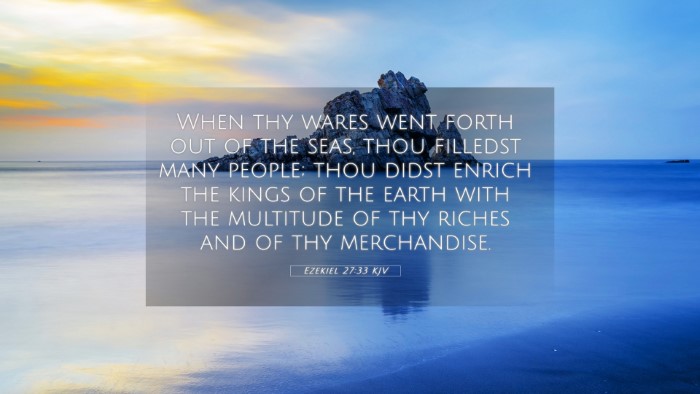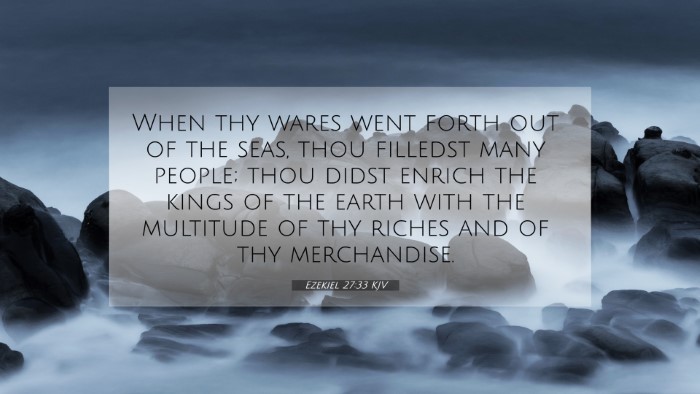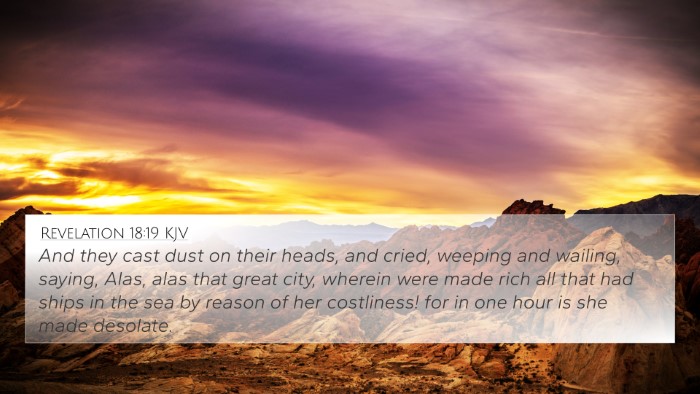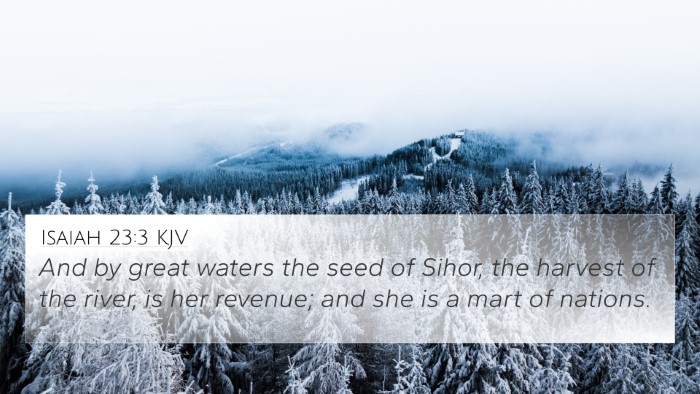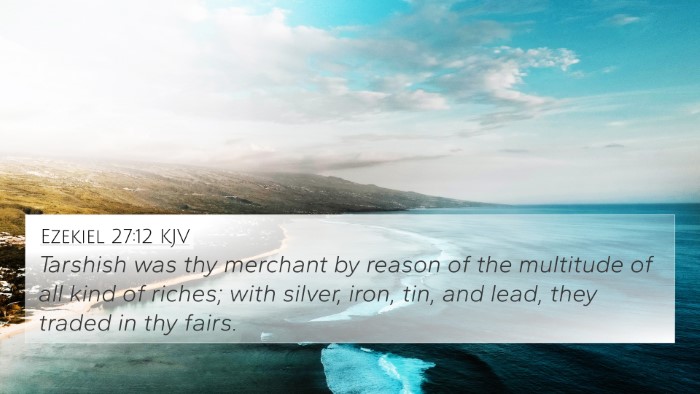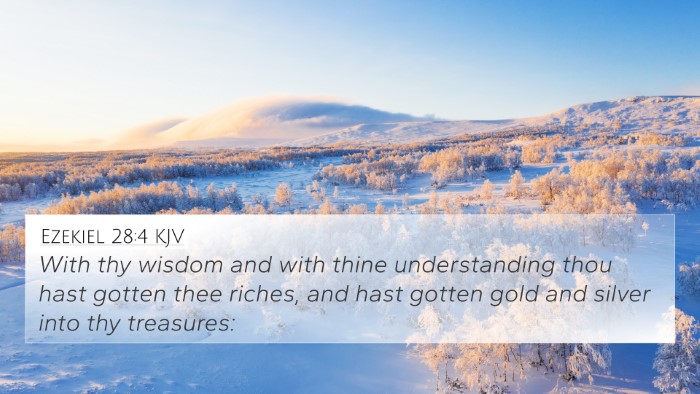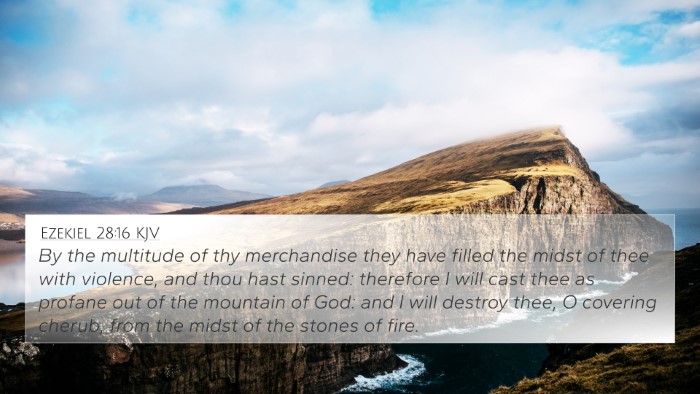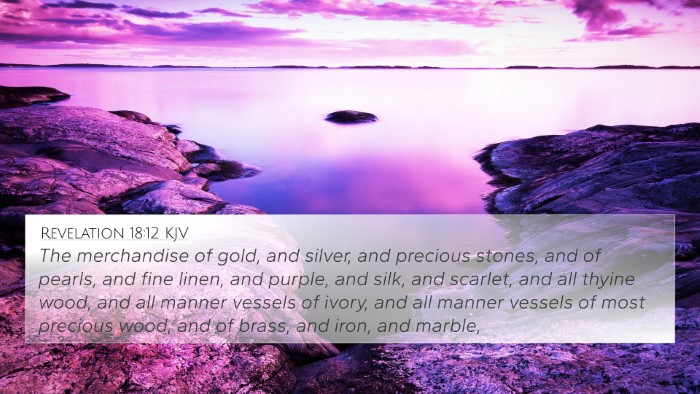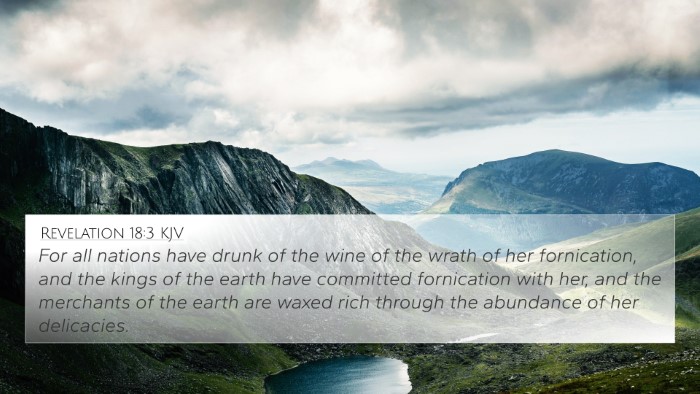Understanding Ezekiel 27:33
Ezekiel 27:33 states: "When your wares went forth out of the seas, you filled many people; you enriched the kings of the earth with your merchandise." This verse encapsulates the themes of commerce, prosperity, and the impact of wealth on nations.
Verse Meaning and Interpretation
In interpreting Ezekiel 27:33, we draw upon the insights from various public domain commentaries.
- Matthew Henry: Henry emphasizes the richness of Tyre's trade and its influence on surrounding nations. He notes how the prosperity derived from its seafaring commerce not only benefited their own people but also extended wealth and resources to others, illustrating a broader principle of how commerce fosters connections between nations.
- Albert Barnes: Barnes focuses on the idea that Tyre’s extensive trade enriched not just the merchants but also the powerful rulers. The verse serves as a commentary on the interconnectedness of economic strength and political power, emphasizing how material wealth can elevate the status of a nation on the world stage.
- Adam Clarke: Clarke highlights the responsibility that comes with such riches. He warns that despite the prosperity, there is a moral and spiritual accountability linked to wealth, indicating that the blessing of economic success should lead to ethical living and stewardship.
Thematic Connections
This verse connects with several Biblical themes regarding wealth, trade, and influence. It resonates with similar passages that delve into the consequences of acquisition and the moral imperatives accompanying it.
Cross-References
Below are several Bible verses that can be cross-referenced with Ezekiel 27:33 to uncover deeper understanding:
- Isaiah 23:8-9 - Discusses the pride of Tyre and its downfall, highlighting the relationship between commerce and divine judgment.
- Revelation 18:11-17 - Portrays the fall of Babylon, echoing themes of wealth and trade leading to ultimate destruction.
- Proverbs 10:22 - "The blessing of the Lord brings wealth, and he adds no trouble to it," indicating divine favor in prosperity.
- James 5:1-6 - Warns rich oppressors about the miseries that will come upon them, suggesting that wealth can lead to exploitation.
- 1 Timothy 6:9-10 - Highlights the dangers of the love of money and how it can lead to ruin and destruction.
- Ezekiel 26:15-21 - A prophecy regarding Tyre's judgment, reflecting on earlier themes of pride and downfall.
- Psalm 49:16-17 - Advises against fearing the wealth of others, reminding that material possessions cannot accompany one beyond life.
- Matthew 6:19-21 - Encourages storing treasures in heaven rather than on earth, pertinent to the temporary nature of material wealth.
- Luke 16:19-31 - The parable of the rich man and Lazarus demonstrates the eternal consequences of how one treats others amidst wealth.
- Jeremiah 48:36 - Directs attention to the cries of Moab, suggesting that wealth can bring both pride and subsequent sorrow.
Connections Between Bible Verses
Understanding Ezekiel 27:33 involves recognizing its place within the broader context of scripture. The connections established in these cross-references illuminate the recurring theme of economic power aligned with ethical considerations throughout the Bible.
Comparative Bible Verse Analysis
Conducting a comparative analysis of Ezekiel 27:33 with the referenced verses sheds light on the consequences of wealth:
- Material Wealth vs. Spiritual Accountability: The prosperity of Tyre (Ezekiel 27:33) juxtaposed with the moral responsibilities outlined in 1 Timothy 6:9-10 shows the risk of prioritizing wealth over righteousness.
- Influence of Trade: Isaiah 23:8-9 and Revelation 18:11-17 illustrate how commercial success does not guarantee divine favor; often, it leads to pride and a subsequent fall.
- The Temporal Nature of Prosperity: Matthew 6:19-21 emphasizes storing up treasures in heaven, contrasting with the temporary richness experienced by Tyre.
Tools for Bible Cross-Referencing
To delve deeper into the connections between biblical texts, consider utilizing tools such as:
- Bible Concordance: A useful reference tool for finding related verses based on keywords.
- Bible Cross-Reference Guide: Provides structured connections between verses.
- Cross-Reference Bible Study: An effective method for extensive study by creating links among passages.
- Bible Reference Resources: Online and printed resources for a more comprehensive study of scriptural connections.
Conclusion
Ezekiel 27:33 invites reflection on the nature of wealth, trade, and moral responsibility. By exploring cross-references to this verse, one can better understand the interconnected messages within the Scriptures, emphasizing the need for ethical stewardship alongside material prosperity.

